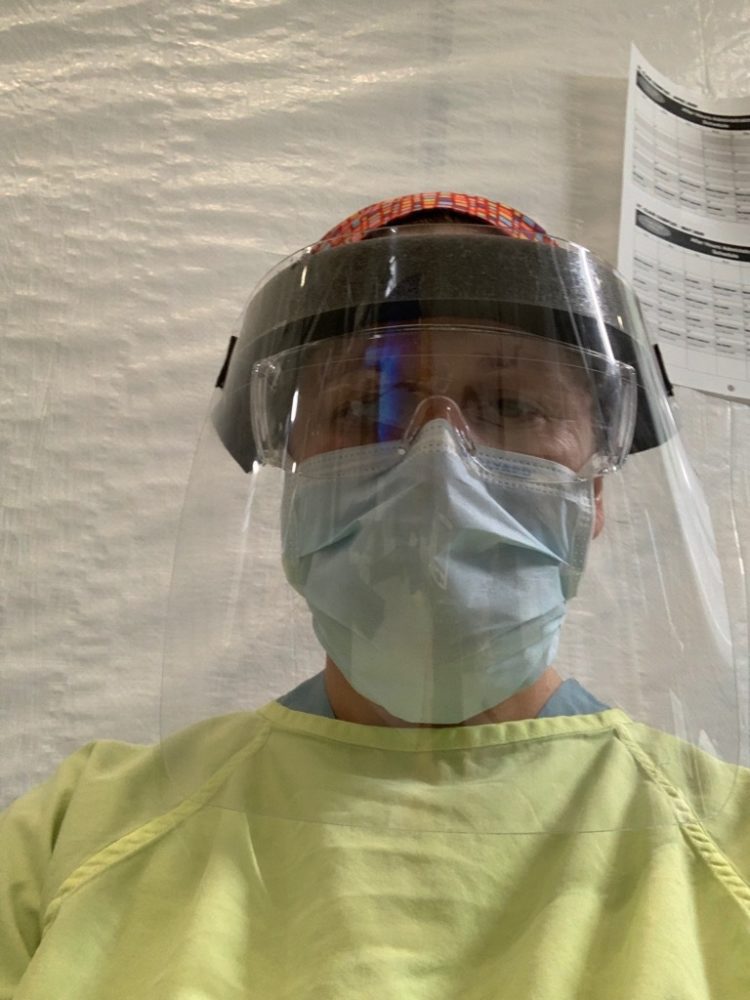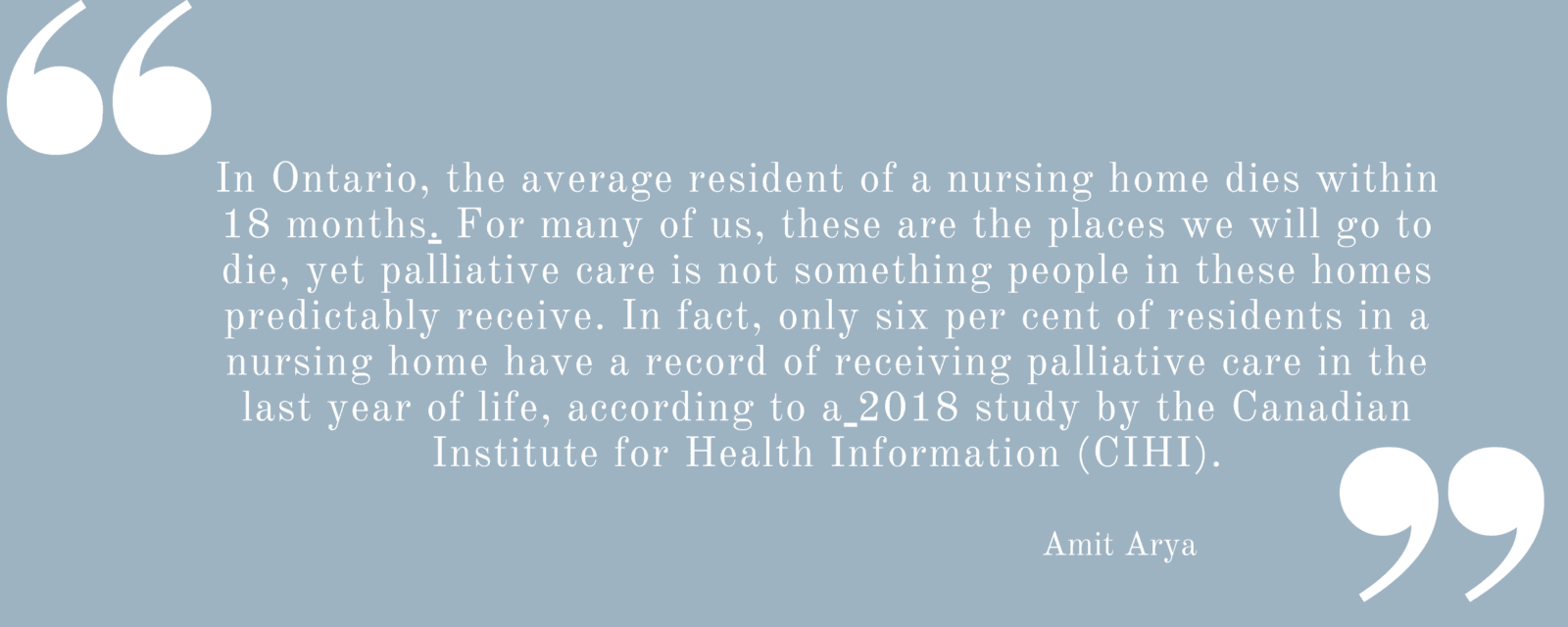As a nation, we have been horrified by the images of long-term care (LTC) residents suffering and dying from COVID-19 with inadequate care. As a palliative care physician, I have mourned for these residents and their families, knowing they suffered needlessly because our healthcare system failed them. The pandemic has illustrated that reform of the long-term care sector is needed now to properly support our aging population and allow all to live life with the quality and dignity they deserve.
Ontario’s palliative care physicians have shown they are ready to help now and going forward. Take, for example, the Windsor Field Hospital. This was a desperately needed success story in a tragedy that spanned not just Canada but the globe. I am honoured to have contributed to the dignity and well being of our long-term care residents while simultaneously ensuring that our hospitals were able to maintain capacity to care for other patients.
In preparation for the possible surge of patients in acute care, our local hospital, Windsor Regional Hospital, transformed the St. Clair College SportsPlex, a stand-alone athletic facility, into a field hospital that could accommodate up to 100 patients to increase healthcare capacity within our region. As we were witnessing the LTC crisis sweep across the nation, COVID-19 outbreaks started in our own LTC facilities. Windsor Regional Hospital stepped into action, moving COVID-19 positive residents out of its LTC facility to the field hospital to help contain the outbreak and relieve staffing shortages within the home.
I was not there when the first 20 residents arrived at the field hospital but I was working on the sidelines to ensure that the facility was equipped to address any of the patients’ palliative care needs. In conjunction with the lead physician, Dr. Marguerite Chevalier, I made sure that the pharmacy was stocked with all the necessary medications for appropriate symptom management and expedited the approval of hospital order sets for the management of COVID-19 positive patients.

Wendy Kennette in full PPE (Personal protective equipment).
I began working at the field hospital shortly thereafter as we continued to admit more COVID-19 positive patients from the LTC facility. That first day, I spent hours on the phone talking to each of the patients’ families and reassuring them that their loved ones were well cared for. Understandably, there was much fear and anxiety about whether their loved ones would survive and how they would manage alone in unfamiliar surroundings.
Many of these patients had dementia so we worked hard to make this gymnasium feel like a home to minimize the possibility of delirium associated with the change in environment and caregivers. The white-tarped walls of their field hospital rooms had pictures of windows on both sides showing gardens on a sunny day. We printed pictures families had emailed and attached them nearby so that our patients could be surrounded by their loved ones. Each of our patients had an iPad so that families could video chat with them whenever they wanted to. For many, this was the first time they were able to see their loved one in months because of the lockdown in LTC facilities. Day by day, I took care of these patients alongside an amazing team of nurses, pharmacy technicians and dietary and housekeeping staff. Everyone pitched in where they could, helping feed and ambulate the patients when able but also sitting by their side to provide comfort and companionship.
As the weeks went on, we suffered our share of losses at the field hospital but these patients were comforted and cared for. Their symptoms were assessed and appropriately managed throughout their end of life journey. Families were supported through difficult times by the healthcare team and were able to hold vigils by their loved ones’ bedside via iPad video forums. On a daily basis, families thanked us for the care we were providing to our patients. This field hospital was a stark contrast to what had been exposed in the news, where LTC residents were found dying alone, neglected and uncared for. By integrating palliative care within the design of our hospital, we ensured that each patient that succumbed to illness did so with comfort and dignity.
For those that recovered, we watched them slowly improve over time. With daily phone calls to family members, we celebrated as their blood pressure stabilized, their oxygen needs improved and their oral intake increased.
As the patients continued to improve, the mood at the field hospital lightened. We celebrated birthdays, held impromptu tea parties and bingo games. By focusing on what our patients needed for quality of life, we turned that gymnasium from a field hospital into a home where our patients not only survived but thrived.
Given the tragedies witnessed during this pandemic, we need to recognize that it is time to redesign how we provide care to residents in long-term care homes. A recent article by Dr. Amit Arya highlights the gaps that have been decades in the making.

The article is not only a critique of the current system but provides real and tangible solutions for improvement. These include increased access to palliative care specialists, appropriate staffing levels and education to provide better care, much of which can be provided through a combination of traditional face-to-face patient care as well as virtual care.
The pandemic has shown that now is the time for a fundamental culture change in how we view long-term care homes and how we provide care within these facilities. Early integrated palliative care within these homes is essential to ensure that our aging population has the quality of care it deserves.
Watch Dr. Kennette talk about the emotional impact patients have on doctors and the human aspect of medicine in this Ontario Medical Association video.


The comments section is closed.
Thank you for this article. My mother was in a LTC facility in Cleveland ohio. We lost her to covid19 on December 5, 2020. My heart still aches, as I think about how she suffered in that facility. The dishonesty and lack of care from the staff. I was never told my mother had covid19, until I saw her on a video non responsive. I want to be apart of LTC reform. We as a society must began to reform our hearts. We need to have compassion and love. The very lives that we advocate for may very well be our own one day. I am currently writing a book and starting my advocate organization. I thank you again for this article and most of all your voice and heart for our elderly and others.
I was so marveled at your article about the latest movies that are trending. However, lots of people don’t have the knowledge that there are websites that you can visit and download movies, TV series for free without being charged for it. I also wrote a content on latest trending TV series. I would love it if you do visit, my platform also to go through my article https://www.techfiver.com/wapquick-download-movies-music-tv-series-images/
Dr Kennette thanks you indeed for sharing your valuable thoughts. COVID-19 has disproportionately affected our senior citizens lives in many ways, especially, those who are living in the long-term care. The statistics would reflect the reality. One percent of Canadians reside in long-term care; however, they represent 80 percent of Covid 19 deaths in Canada (1).
Fall 2019, the National Institute on Aging warned long term care homes were plagued by conditions that increased the risk of spreading infections: people living in close quarters in residences faced with chronic shortages of staff, with little space or ability to enforce proper physical distancing measures, where poorly paid employees often work on a part-time basis at multiple facilities, increasing the risk (1).
In Canada, provinces are responsible for health and long term care services. Long-term care is not covered by the Canada Health Act, so there are no federal or national standards or guidelines. Therefore, health care community should advocate for adequate funding to provide safer, more effective care. It is our huge obligation to support to the national call to bring long-term care under the Canada Health Act, which would include targeted federal funding, national standards of care (including an increase to 4.1 hours of care per day), and place limits on private, for-profit care. Previous evidence based literature including a systematic review published in the CMAJ, shows clearly that the for-profit care model is not a good idea. Fifteen observational studies, involving more than 26 000 hospitals and 38 million patients, with adjustment for potential confounders, private for-profit hospitals were associated with an increased risk of death (relative risk [RR] 1.02, 95% confidence interval [CI] 1.003-1.038; p = 0.02). This meta-analysis suggests that private for-profit ownership of health care institutions, in comparison with private not-for-profit ownership, results in a higher risk of death for patients (2).
I also wanted to emphasize that blame should not be ascribed to any individuals or a particular government after a loss of so many of our beloved parents and grandparents, instead, we all should accept the critical lessons learnt to avoid future outbreaks in these institutions, and strongly advocate for appropriate systems changes. If we are to learn anything from these disturbing statistics, it is that older people require special assistance not only to prevent and respond to COVID-19 outbreaks, but for the optimal management of other acute and chronic conditions, including the mental illness, social isolation, overall well being and during the pandemic. This is clearly the responsibility of our health care community.
REFERENCES:
(1).https://www.thestar.com/politics/federal/2020/05/07/82-of-canadas-covid-19-deaths-have-been-in-long-term-care.html
(2). Devereaux PJ, Choi PT, Lacchetti C, Weaver B, Schunemann HJ, Haines T, et al. A systematic review and meta-analysis of studies comparing mortality rates of private for-profit and private not-for-profit hospitals. CMAJ 2002;166(11): 1399-406.
Thank you very much for you comment Ediriweera. I agree with you that it is time that we all step up and strongly advocate for appropriate systems changes.
This is so amazing. Thank you
Well done Dr. Kennette. You and WRH should be very proud of the Windsor Field Hospital. Enough cannot be said about the staff and administration who made this possible.
While solutions for LTC are still required, it is inspiring to see friends and colleagues do what needed to be done to take care of a vulnerable patient population.